Why I believe (most) utility tokens are a bad investment 🤔
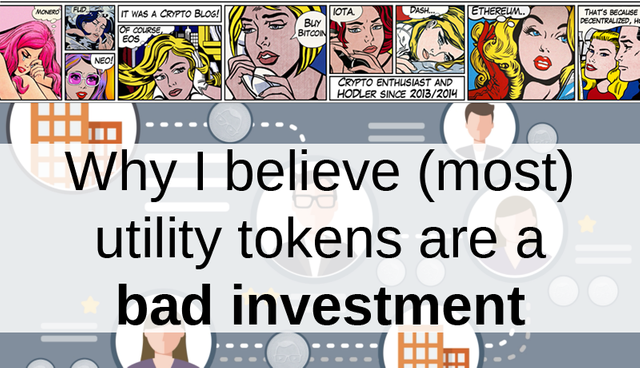
A large amount of cryptocurrencies are utility tokens, for example in supply chain blockchains, digital identity blockchains or tokens that have utility within a specific dApp. While blockchain seems extraordinarily suited for these type of systems, I am very skeptical about the speculative investment value of the tokens within these eco-systems.

Utility Tokens
Utility tokens are as their name implies tokens that serve a specific utility. These are different from currencies (like BTC, LTC) which serve no purpose other than as a currency, and also different from security tokens which act more like 'shares' of a company/network (and often pay out dividends). Utility tokens instead are more similar to 'credits' to be used for a certain service (in the future) within an eco-system.For example, a well-known and liked utility token is the Basic Attention Token which functions as the native token to the Brave Browser and which lets advertisers pay for ads, and then redistribute those earnings to users of the browser. Other examples include supply chain/logistic blockchains, where the utility is to register something onto the blockchain, or similarly identity-focused blockchains where the token is utilized for identity verification purposes.
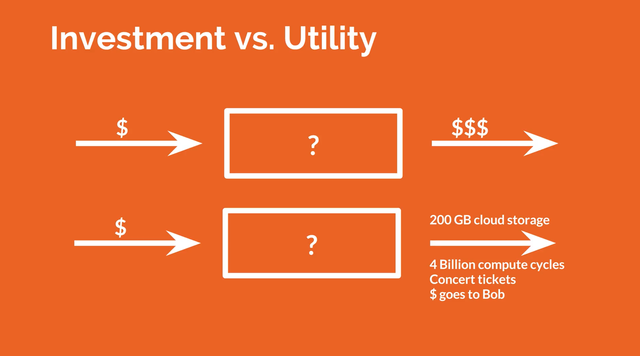
source

Investing in utility
Different from being a 'shareholder' of a network as per security tokens, and different from capturing a certain percentage of the market cap of 'money' as per currency-tokens, when you invest in most utility tokens you are essentially betting on the demand of the usage of the utility token in question.Utility tokens serve a single purpose: to pay for services on the network. Since most utility tokens have a limited maximum supply, this allows for speculation to occur on the tokens themselves. The reasoning behind this is simple: If enough demand exists for the service provided, there will be a high demand for the utility token to utilize the service therefore creating scarcity and price appreciation.
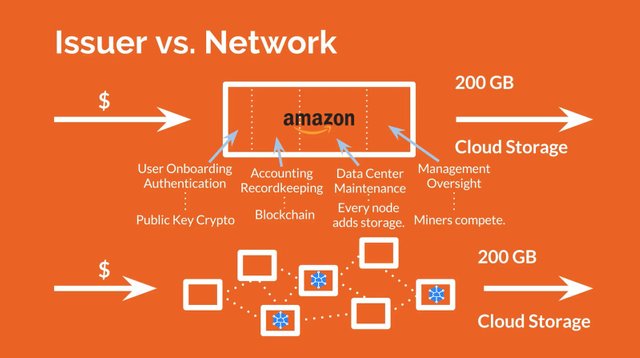
source
Oftentimes enthusiasts will point out to the market value of existing markets, about to be disrupted by this new technology, to show the potential market value of the token in question. For example, one may point out the existing $400 billion market for cloud computing, as an argument for why a cloud-computing blockchain could be worth a great deal if it were to only capture 5% of that market. Similar comparisons exists for most other projects and the markets they seek to disrupt.
I believe this method of comparison and speculation is erroneous and dangerous, because it ignores some basic fundamentals that I believe apply to utility tokens.

Utility tokens are for usage
When we talk about how much value is transacted within a certain market we talk about the transactions, but this is very different from how much money is currently locked up in that market.If utility tokens derive their value from demand and usage (=scarcity), then their value is determined every minute by how much demand exists on that moment for the service. While a total of X amount of dollars may flow through the system each year the actual amount of money in the system at any given time is likely to be a lot smaller than the total worth of transactions throughout the entire year.
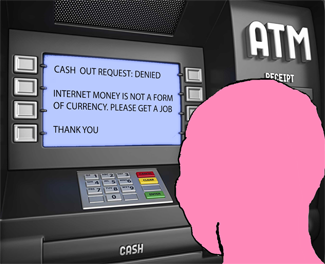
While loyal enthusiasts may HODL, most market
participants will be looking to cash out
The purpose of a utility token is to pay for a service. This service is provided by the nodes in the network, whose entire business model revolves around it. These nodes have business expenses and market dynamics should push prices down to cost-prices, plus a little fee for the node to economically incentivize it. Once the service is provided, therefore, most of the value paid by the buyer is subsequently taken out of the system to pay for costs and quite frankly, without additional HODLing incentives I imagine this applies to the profits as well.
In essence this means that value only enters and exists in the blockchain during the service, but it leaves the blockchain after the service is provided. Tokens are bought in the initial stage of the transaction, and are sold by the nodes after the service is provided. When looking for the value of a utility token it is therefore not only important to look at how much demand there will be for it, but also how long tokens are utilized by the network and how quickly they flow back into the markets. If as many tokens are cashed out as there are entering the system, there will be a market equilibrium - not a price rise. The velocity of the blockchain is therefore also a determining factor in valuation of the token, where (contrary to what your instinct may say) a high transaction speed might actually mean that the token price might be negatively affected because value can exit the blockchain faster.

Utility tokens have limited upside potential
Even when we forego the fact that for every utility token out there, there are a dozen competitors out there with the same idea, the maximum potential upside of utility tokens is often very limited. As I've indicated above the often used yearly total market volume gives a skewed view on determining the token price, and even when capturing 5% of any market (which would be an amazing feat on it's own) we still have to consider that the yearly value is several orders of magnitude larger than what the actual supply and demand at any given moment represent. Dividing these yearly estimates by 365 days already paints a different picture, and it gets even worse when you try to determine it on a per-minute or second basis (which would be more indicative of the volume at a given moment).One must also ask the question: How much are participants in the network willing to pay for the blockchain services? I often find myself wondering this when looking at supply chain and other logistics blockchains. Surely, the decentralized ledger offers innovations here - but how much are you expecting logistics companies to pay for accessing the ledger? How much value/money do you expect any given shipping company to 'lock up' in use on the blockchain at any given time? When I look at something like WaltonChain or VeChain, I can't help but ask: Will shipping companies using this blockchain really put billions of dollars of blockchain tokens into these systems at any given moment? It probably wouldn't really be a cost-saving operating if that was the case. Instead, I expect that if companies are to be incentivized to use blockchains, the cost of utilizing them will likely be very small. Of course, if the amount of money they need to pay for usage is small, it makes no sense to expect them to pay billions. Let alone leaving those billions locked up in utility tokens.
Lastly, the upside potential is often severely limited by it's niche. Even when taking the total market value of a sector, that sector is often already limited in size. Take for instance the $400 billion cloud computing example above. If this is the total value of the market on a yearly basis, then this more or less 'caps' the potential upside to that point as well - and perhaps a little bit of yearly growth after that. There simply isn't a bigger market for it. The speculative value of utility tokens therefore varies greatly and is highly dependent on which sector it aims at. Some utility tokens focus on sectors that are much smaller than cloud computing.

Utility is what you use and how you earn value, but currency is where you store your value
On the other side of the coin (pun intended) are the tokens which aim at being a store of value. These would primarily be currency oriented cryptocurrencies, with Bitcoin being the most notable.The store of value aspect is extremely important when looking at investment opportunities. After all, second to making a profit, another goal of investing is retaining value. Some utility tokens could serve as a store-of-value as well, but most fall short in this regard. And after all, with a limited potential upside at some point the ceiling will have been reached - and nobody likes a stagnating asset.
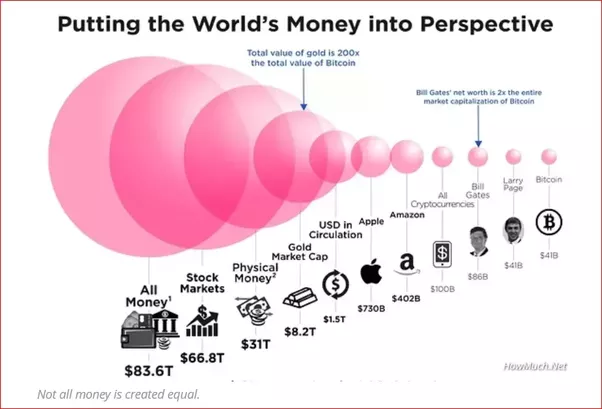
source
Currency and store of value oriented cryptocurrencies do not suffer from a ceiling to their potential upside. In fact, the maximum potential of something like Bitcoin is: "all the value of everything that exists in the world", if you believe in something like Hyperbitcoinization. The incentive to HODL is almost never-ending, because it can go up almost infinitely.

I do believe there is a great future for all kinds of blockchains and I also believe that many of them will be heavily used in the future, but as I've outlined above I have my doubts about whether most utility tokens are in fact great investments. I believe in a future where all kinds of dApps exist and are used, perhaps even with their native tokens - but they won't be where we actually store our money. Utility tokens are for using and earning wealth, but cryptocurrencies like Bitcoin is where you're going to actually end up storing that wealth. After all, would you rather have 1000 coupons for shipping boxes, or would you rather have the $1000 equivalent (or perhaps that should be ₿1000)? I think, all things considered, most people would rather have money rather than service-coupons.
I do hold some investments in utility tokens that I like, most notably Basic Attention Token (BAT) and TheKey (TKY), but I only have tiny positions in them for the reasons above. I consider this to be mostly my way of supporting the project, and keeping up to date with it, but I simply can't imagine that at any given time billions of dollars will be locked up into them like is the case with Bitcoin. I realize that some people would say tokens like ETH are utility tokens as well, but I feel different dynamics apply because of the wide-scale ecosystems built on top of these platforms (indeed, many utility tokens are built on Ethereum) and quite frankly, perhaps a new categorization for these type of platform-utility tokens needs to exist.


is EOS a utility token?
That's a tough one to answer. In a way, yes it is because it's the token to pay for services on the ecosystem. But since EOS, much like Ethereum or other platforms, have such a wide scale of dApps building on top of them I would consider this to be a better investment than to invest in one particular dApp token on top of EOS.
But EOS is a difficult call, because of their 1 year long ICO. Most ICO's are said to become securities, and it was a big surprise to see the authorities say that ETH was not a security since it also had an ICO. The reasoning for this was that the Ethereum network was decentralized and no one party could be said to be in charge of providing profits. With EOS there's Block One of course, and some may say it's a similar situation as with Ethereum and the Ethereum foundation, but others might argue that EOS is not as decentralized as Ethereum.
It's going to be up to the regulators, really, to decide
I agree with you. Utility tokens looks to me that are constraining you too much, obliging us to use the service they promote and so is like closing your eyes for other things.
Yes and also since most utility tokens exist on platforms like ETH, I think it's better to buy the platform instead since you'd have your feet wet in all the utility tokens built on top too by proxy
I always understood utility tokens as those that grant its possesors certain abilities. Thus said Steem is utility token for me and BAT is not an utility token. Where did you come up with such a definition? Truth be told I never search for the definition, I only used the definition of a word utility.
There are a bunch of websites offering explanations for each type of token. I didn't get my info from any specific site but just from overall market knowledge. If you're interested in reading up on the different types here is a website that offers some explanations
Thanks for the source...I will be off for next 4 days but ill give it a read aftewards and reply then.
I have had the same thoughts about these utility tokens. They can provide access to useful services, but unless the service is absolutely essential and pretty much a monopoly then they don't appear to be anything better than a loyalty scheme.
Indeed. I do think that some utility tokens may one day grow into currencies.. like a social media platform with it's own token. If everybody ends up using that, it may very well function as currency one day. But that's still a loooong way off, and no way of knowing which it will be.
I love my utility tokens and I am very happy with them. I think that you demand argument is erroneous in that I believe that the value of any crypto is determined by demand. Having said that, I do agree with most of your post, which is why I select my tokens rather carefully. I think though that a company will use whatever it can to save money. If that means buying some "funny money" then they will do so - driving up demand and price for the coin/token. Your arguments about throughput and re-entry into the system are very valid. This is why the token economics portion of a whitepaper is so important. Handled correctly, I think that a utility token can continue to scale in value indefinitely while still costing the same to use to the likes of partner companies. Take a token like BNB for example. Token burns increase the value by decreasing supply. But you save trading fees if you pay in BNB - based on the current BNB price. Therefore you can always pay half price on trading fees if you buy BNB and use it immediately, no matter how expensive it becomes, and the BNB price can continue to rise. (Yes I know this example is flawed because of multiple technicalities I have ignored, but that does not change the point.) Or look at LOCI I spoke about a few days back. You can pay a fixed amount of LOCi or $249. It's almost like creating a stable token, only better. The price can be altered if desired. It also creates instant demand for you token as a way for users to radically cut costs.
If you grow tired of that BAT or TKY, feel free to send that useless rubbish my way! 😜 (I sold my BAT long ago and I still regret it)
Yes, in the demand argument it really should be 'demand & usage' .. I meant to say that the price depends on how much the network is being used at any given moment.
But yes, demand is underlying to all value of course.. supply vs demand.
I had to think a little on the BNB example, which is a good one and also a very interesting token model IMO, but doesn't the guaranteed token burn kind of make it into a security by failing the howey test (expectation of profit) ? I think it probably does..
Securities are IMO great investments btw :)
I'm not sending BAT or TKY anywhere! I'm poor in RL, I need my crypto!!!
I've been casually selling BAT at the tops. I've learned that it never goes above 6K satoshi's, so it's safe to buy low and just sell whenever it goes above 5K satoshi's. It happens every damn time... I'm sure at some point it will surpass it, but up until then it's actually a pretty good/safe market to trade in if you're so inclined.
TKY I like but I sometimes feel guilty about supporting China's 1984 state.... TKY is one of the ways how they're gonna do it and I'm profiting off of that?! 😱
Don't worry about China, worry about us. Remember that judging a very different culture by the standards over your own will always make it seem "wrong" or "weird".
Whatever China are doing, it is working. Their already massive economy is Mooning! Since China is rather good at stamping out corruption, I am confident that with their communist principles, most of the country will ultimately benefit from their success. For TKY (and NEO for that matter) to play a part in this is okay with me! I far prefer it to capitalist greed that is designed and regulated to enrich the rich. I also hold TKY and will keep holding it tightly!
Congratulations! This post has been upvoted from the communal account, @minnowsupport, by pandorasbox from the Minnow Support Project. It's a witness project run by aggroed, ausbitbank, teamsteem, theprophet0, someguy123, neoxian, followbtcnews, and netuoso. The goal is to help Steemit grow by supporting Minnows. Please find us at the Peace, Abundance, and Liberty Network (PALnet) Discord Channel. It's a completely public and open space to all members of the Steemit community who voluntarily choose to be there.
If you would like to delegate to the Minnow Support Project you can do so by clicking on the following links: 50SP, 100SP, 250SP, 500SP, 1000SP, 5000SP.
Be sure to leave at least 50SP undelegated on your account.
A lot of those utility coins will become shitcoins that fill no purpose in the world, unfortunately.
Great post. Token velocity is one of the topics I cover when I research a project. In most cases, founders don't have a great answer when I ask them about it. It is an extremely important part of token economics and very hard to get right.
A great video about it is this one:
Thanks for sharing your thoughts, I agree :-)